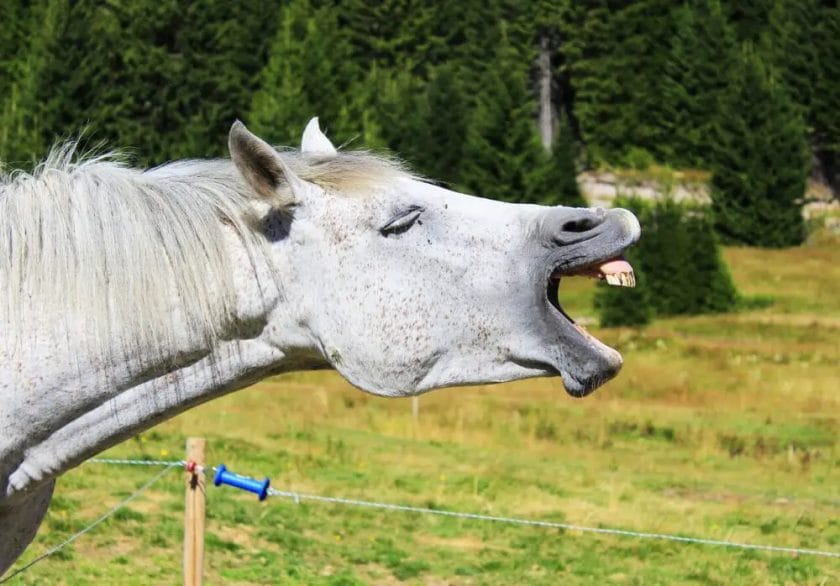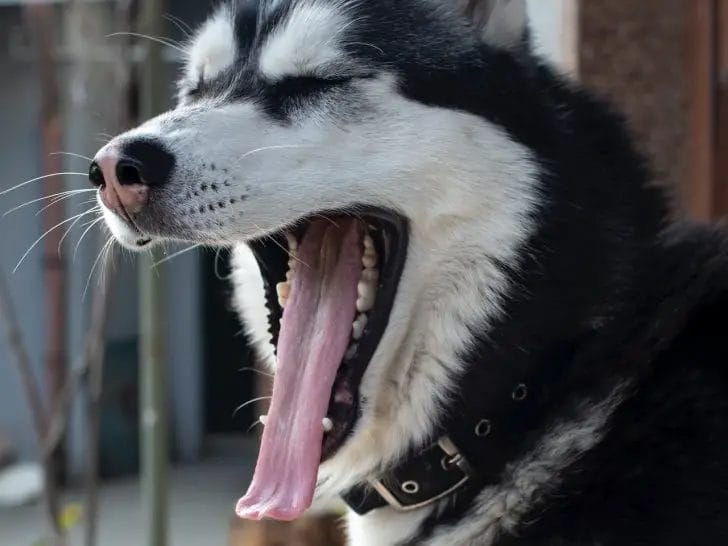A horse yawning is not just a simple reflex, but it can communicate various things about its physical and emotional state.
Yawning in horses can indicate relaxation, boredom, fatigue, or even a sign of discomfort or pain.
In some cases, a horse may yawn as a response to stress or anxiety, while in others it may be a way for them to release tension.
It’s important to pay attention to a horse’s overall body language and behavior to better understand the meaning behind their yawns.

Understanding Equine Behavior: Unraveling the Secrets of Horse Yawning
As horse owners and enthusiasts, we are constantly fascinated by the behavior of these majestic creatures. One behavior that often catches our attention is horse yawning. Yawning is a universal behavior observed in many animals, including humans, and it serves a variety of purposes. In this section, we will delve into the intriguing world of equine behavior to unravel the secrets behind horse yawning.
The Science Behind Yawning
Before we dive into the specifics of horse yawning, let’s explore the science behind this seemingly mundane action. Yawning is an involuntary reflex triggered by various factors, including fatigue, stress, and changes in brain temperature. It involves the deep inhalation of air, followed by a prolonged exhale.
Research suggests that yawning plays a crucial role in regulating brain function. It helps increase oxygen intake, cool the brain, and stimulate arousal and alertness. Moreover, yawning is believed to be contagious, with the act of seeing someone yawn often triggering a yawn in others.
Yawning in Horses
Now that we have a basic understanding of yawning, let’s focus on its occurrence in horses. Yawning in horses is quite common and can be observed in various situations. Here are a few key insights into horse yawning:
- Sign of Relaxation: Horses often yawn when they are in a relaxed state. It can be seen after a strenuous exercise session, during grooming, or when they are enjoying a nap in the sun. Yawning is believed to be a way for horses to release tension and indicate a sense of calmness.
- Social Communication: Yawning in horses is also known to serve as a form of social communication. When one horse yawns, it can trigger a yawn in other horses nearby. This contagious yawning is believed to be a way for horses to bond, synchronize their behavior, and communicate their state of relaxation to the herd.
- Stress Indicator: While yawning is often associated with relaxation, it can also be an indicator of stress in horses. Chronic stress or discomfort can lead to excessive yawning, which may be accompanied by other signs of distress, such as pinned ears, tail swishing, and restlessness. It is important for horse owners to be aware of these behavioral cues to ensure the well-being of their equine companions.
Understanding Your Horse’s Yawning Patterns
As a horse owner, it is essential to pay attention to your horse’s yawning patterns and behavior. By observing when and why your horse yawns, you can gain valuable insights into their well-being and overall state of mind. Here are a few tips to help you understand your horse’s yawning patterns:
- Context: Take note of the situations in which your horse yawns. Is it after a training session, during a specific grooming routine, or when they are in a particular environment? Understanding the context can provide clues about whether the yawning is a sign of relaxation or stress.
- Body Language: Pay attention to your horse’s body language when they yawn. Do they appear relaxed and content, or do they show signs of discomfort? Combining yawning with other behavioral cues can help you decipher its meaning.
- Veterinary Evaluation: If you notice excessive or abnormal yawning in your horse, it is advisable to seek veterinary evaluation. Excessive yawning may be a symptom of an underlying health issue or chronic stress that requires professional attention.
In summary, horse yawning is a fascinating behavior that serves various purposes in equine communication and well-being. Understanding the context, body language, and patterns of your horse’s yawning can provide valuable insights into their state of mind. By nurturing a deeper understanding of equine behavior, we can strengthen our bond with these incredible animals and ensure their overall welfare.

The Science Behind Horse Yawning: Exploring the Reasons and Implications
Yawning is a common behavior observed in many animals, including horses. While it is often associated with tiredness or boredom in humans, the science behind horse yawning is quite fascinating. In this section, we will delve into the reasons behind why horses yawn and explore the implications it may have on their overall well-being.
1. Physiological Response
Yawning is primarily a physiological response that serves various functions in animals. It is believed to play a role in regulating brain temperature, increasing blood circulation, and removing carbon dioxide from the bloodstream. In horses, yawning is thought to have similar physiological effects.
One theory suggests that yawning helps horses to stretch their jaw muscles, promoting blood flow and oxygenation to the brain. The act of yawning also helps to stimulate the release of neurotransmitters, such as dopamine and serotonin, which can induce a feeling of relaxation and contentment.
2. Social Dynamics
Horses are highly social animals and rely on nonverbal cues to communicate with one another. Yawning is considered a contagious behavior in horses, meaning that it can be triggered by observing another horse yawning. This phenomenon is known as “infectious yawning.”
Research has shown that contagious yawning in horses is more likely to occur within established social groups. It is believed to be a form of social bonding and can indicate a level of trust and comfort between individuals. Yawning in response to another horse’s yawn may also serve as a form of empathy, reflecting the horse’s ability to understand and respond to the emotional state of its herd mates.
3. Stress and Emotional State
Horses, like humans, experience a range of emotions, including stress and anxiety. Yawning can be an indicator of these emotional states in horses. During stressful situations or when experiencing discomfort, horses may yawn as a way to release tension and alleviate their distress.
Furthermore, studies have shown that yawning in horses can be associated with changes in their cortisol levels, a hormone that is released in response to stress. High levels of cortisol indicate elevated stress levels, and yawning has been observed to coincide with a decrease in cortisol, suggesting a potential stress-relieving effect.
4. Health and Well-being
In addition to its social and emotional implications, yawning in horses can also have implications for their health and well-being. Excessive or abnormal yawning may be a sign of underlying health issues, such as respiratory problems, dental issues, or discomfort in the jaw or throat.
It is essential for horse owners and caretakers to be aware of any changes in their horse’s yawning behavior and seek veterinary attention if necessary. Regular dental check-ups, proper nutrition, and a comfortable living environment can help ensure the overall well-being of horses and reduce the occurrence of abnormal yawning.
Summary
In summary, horse yawning is a complex behavior that serves various purposes. It has both physiological and social implications, indicating a horse’s emotional state, level of comfort, and overall well-being. Yawning in horses can be contagious, reflecting social bonding and empathy within a herd. It can also be a stress-relieving mechanism and may indicate underlying health issues. By understanding the science behind horse yawning, we can better care for these magnificent animals and promote their overall health and happiness.

Is it Normal? Exploring the Frequency and Patterns of Horse Yawning
Yawning is a natural behavior observed in many animals, including horses. While it is commonly associated with fatigue or boredom in humans, the reasons behind horse yawning remain a topic of interest and speculation among researchers and equestrians alike. In this section, we will delve into the fascinating world of horse yawning, its frequency, and patterns, to gain a deeper understanding of this unique behavior.
1. The Frequency of Horse Yawning
Horse yawning, although less commonly observed compared to other behaviors such as eating or grooming, is a fairly common occurrence. The frequency of horse yawning can vary depending on various factors such as age, health, and environment. It is important to note that the frequency of yawning can also vary between individual horses.
Studies have shown that horses tend to yawn more frequently in certain situations, such as during times of stress or excitement. Yawning can also be observed after periods of intense physical activity or during times of relaxation. The exact reasons behind these variations in yawning frequency are still being explored, but it is believed that yawning in horses serves multiple purposes.
2. The Patterns of Horse Yawning
Horse yawning does not occur randomly; instead, it follows distinct patterns that can provide valuable insights into the behavior and well-being of horses. Yawning in horses can be categorized into two main patterns: spontaneous yawning and contagious yawning.
Spontaneous yawning: Spontaneous yawning refers to yawning that occurs independently, without any external triggers. It is believed to serve as a self-soothing mechanism for horses, helping them to release tension or regulate their arousal levels. Spontaneous yawning is more common when horses are in a relaxed state, such as during grazing or resting.
Contagious yawning: Contagious yawning is a phenomenon where one horse yawning can trigger yawning in nearby horses. This pattern of yawning is similar to what is observed in humans and some other social animals. Contagious yawning in horses is thought to play a role in social bonding and communication. It is more commonly observed in horses that have strong social connections or live in close proximity to each other.
3. The Significance of Horse Yawning
While horse yawning may seem like a simple behavior, it holds significance in understanding the overall well-being and health of horses. Yawning can provide clues about the horse’s emotional state, stress levels, and physical comfort. It can also indicate the horse’s level of engagement or disengagement with its surroundings.
For equestrians and horse caregivers, paying attention to yawning patterns can help them identify potential issues or sources of stress in their horses. If a horse begins yawning excessively or in specific situations, it may be a sign of discomfort, anxiety, or underlying health problems. Conversely, a lack of yawning in a horse can indicate a lack of relaxation or engagement.
In summary, horse yawning is a natural behavior that serves various purposes in the equine world. Its frequency and patterns can vary depending on factors such as age, health, and environment. By understanding and observing these patterns, equestrians and researchers can gain valuable insights into the well-being and communication of horses.
From Boredom to Communication: Examining the Range of Interpretations for Horse Yawning
In the animal kingdom, certain behaviors can often carry multiple interpretations. One such behavior that has sparked curiosity and debate among researchers and horse enthusiasts alike is the act of yawning in horses. While yawning is a common occurrence in many animals, including humans, its significance and meaning in the context of horses have been the subject of extensive study.
Yawning in horses has traditionally been associated with boredom or fatigue. It was commonly believed that horses yawned as a way to alleviate stress or express their dissatisfaction with their environment. However, recent research suggests that there may be more to it than meets the eye.
The Traditional Interpretation: Yawning as a Sign of Boredom
For years, horse owners and trainers have observed yawning as a potential indicator of boredom in their equine companions. It was believed that horses would yawn in situations where they were lacking stimulation or felt unengaged. This interpretation led to the notion that yawning was a behavioral response to alleviate boredom and potentially signify a need for more mental or physical activity.
Some researchers argue that yawning in horses may be more closely linked to stress and frustration rather than simple boredom. They suggest that horses may yawn as a coping mechanism when faced with challenges or uncomfortable situations. In this view, yawning serves as a form of self-soothing and helps horses regulate their emotions in stressful environments.
A Communicative Function: Yawning as a Social Signal
While the traditional interpretation of yawning in horses focused on internal states such as boredom or stress, recent studies have shed light on the possibility of a communicative function. It is now believed that horses may use yawning as a way to convey messages to other horses or even humans.
Research has shown that horses are highly perceptive animals with the ability to pick up on subtle social cues. Yawning, in this context, could serve as a form of communication between horses, signaling relaxation, submission, or even a call for a social interaction. Horses may yawn as a way to establish trust and build social bonds with their peers or to signal to humans that they are receptive and non-threatening.
This communicative aspect of yawning has sparked interest among researchers and has opened up a new avenue of exploration in the field of equine behavior. Understanding the range of interpretations for horse yawning can help horse owners, trainers, and handlers better understand and respond to their equine partners.
In summary, the act of yawning in horses is a behavior that carries multiple interpretations. While it has traditionally been associated with boredom or fatigue, recent research suggests that it may have a more complex meaning. Yawning in horses could be a response to stress, a form of self-soothing, or even a way to communicate with other horses or humans. Further research is needed to fully understand the range of interpretations for horse yawning and its significance in the social dynamics of these majestic animals.
FAQs
What does it mean when a horse yawns?
When a horse yawns, it is usually a sign of relaxation or getting ready to sleep. Yawning helps horses to stretch their jaw muscles and increase their blood flow. It can also occur in response to stress or fatigue, so it’s important to consider the context and other behaviors exhibited by the horse.
Conclusion
In conclusion, when a horse yawns, it is often a sign of relaxation or a way to stretch their jaw muscles. While it may resemble human yawning, the reasons behind it are different. Yawning can also be a response to changes in their environment or a way to release tension. It is important for horse owners and handlers to observe their horses’ body language and overall behavior to determine the context in which the yawn occurs.
Understanding the meaning behind a horse’s yawn can help improve communication and ensure their well-being. So, next time you see your horse yawning, take it as a signal of contentment and give them the care and attention they deserve.
